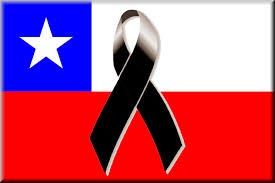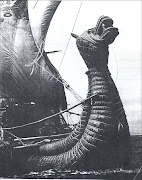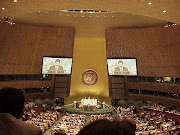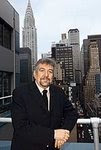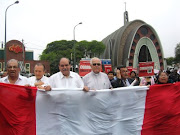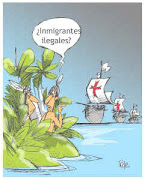| |
Index 2 million displaced after Chile's Quake Articles from all the political currents on the creation of the new Community of Latin American and Caribbean States Tara Hoyos: A Latin candidate in the short list for Miss Great Britain 2010 
Editorial This week there are two important news on Latin America and the Caribbean. The first one is a positive one. In the Mayan Mexican coast was created the new Community of Latin American and Caribbean States (CELAC), the first organization that would unite the entire region without the USA and Canada. The CELAC is a new block that is integrating 1/6 of the world's territories. In the upcoming years it is going to have one permanent member in the UNO's Security Council and two of the five largest economies. It is the area where 90% of all the speakers of the main Western linguist group are concentrated (Spanish/Portuguese). The second news item is very tragic. On Saturday an earthquake 50 times stronger than the one that destroyed Haiti seven weeks ago happened around the Bio Bio River (the traditional limit between the Incas and the Mapuches). At this moment there are only registered some few hundreds of deaths and some few thousands of disappeared Chileans. However, there are 2 million displaced people. London has a role to play in both instances. London has more than 500,000 Caribbean and Latin American residents. It is Europe's largest Latin American and Caribbean city. Its main carnival is Caribbean - Latin American. London has more Latin and Caribbean than the inhabitants of half of the capitals of the new CELC. As the Mayor of Los Angeles said the role of the local community should be a very strong basis for developing commercial and cultural links with a community that has more people and more land than the European Union. On the other hand Chile is at Britain's hearth. The Chilean community has been the backbone of the UK's Latin American community. The founder of the Chilean republic, Bernardo O' Higgins, lived in London and his father was an UK citizen. The links between Chile and Britain has been always very strong. We hope that London should support all efforts to support the Chilean victims and to establish links with the new Latin American and Caribbean Community of States. MINKA NEWS MINKA NEWS: EDITOR RAUL MANCERA. EDITORIAL BOARD: CARLOS BURGOS, ISAAC BIGIO, LUIS NARANJO, RAUL MANCERA, OSVALDO GOMEZ 
SUPPORT CHILE CONTACT MIGUEL MERCADO, CHAIR OF THE LATIN AMERICAN HOUSE. HE IS ALSO A CHILEAN FROM CONCEPCION (THE CENTRE OF THE EARTHQUAKE). PHONE: 07948350996 OR E-MAIL: miguelmercado@ntlworld.com 2 Million Displaced After Chile Quake (New York Times) 
Tomas Munita for The New York Times Some earthquake survivors slept in front of their destroyed homes in Talca. More Photos » Published: February 28, 2010 LIMA, Peru — The ground underneath Chile continued shaking on Sunday as jittery residents took stock of the devastating magnitude 8.8 earthquake that flattened homes, toppled bridges and took more than 300 lives over the weekend. Among the dead were Lurde Margarita Arias Dias, 24, and her infant child, who were crushed as a wall toppled in their Santiago home. "I tried to save them," Adan Noe Saavedra Rios, Lurde's husband and a member of Chile's Peruvian community, told local reporters. He described his frantic wife rushing from the house with their daughter in her arms after the ground started moving. Before he knew it, they were covered in rubble. More than 2 million people have been displaced by the quake, according to the National Office of Emergency. Sunday morning's aftershock was measured at a magnitude of 6.1, the strongest of about 60 to reverberate since the quake. The death toll was expected to rise. In Concepción, Chile's second-largest metropolitan area, which appeared to be especially hard hit, the mayor said Sunday morning that 100 people were trapped under the rubble of a building that had collapsed, according to Reuters. Power and communications networks were still largely out of operation on Sunday, hampering search and rescue efforts. Images from Chile of toppled buildings, upturned cars and bodies being hauled from rubble resembled those of Haiti just over a month ago. But because of better building standards and an epicenter farther from populated areas, the scale of the damage from Chile's significantly more powerful earthquake was nowhere near the devastation that Haiti suffered. Televised images from Concepción on Sunday showed looters being detained by police as they sprinted out of a damaged supermarket carrying armloads of merchandise. But authorities said that calmness prevailed in most of the country. The earthquake hit during Chile's summer vacation, and that left thousands of Chileans stranded overseas. There were frantic scenes at airports throughout the region as the closing of the damaged Santiago airport prompted airlines to cancel or reroute flights away from the Chilean capital. In Concepción, which is roughly 70 miles from the quake's center, cars lay mangled and upended on streets littered with telephone wires and power cables. A new 14-story apartment building fell, while an older, biochemical lab at the University of Concepción caught fire. In the nearby port of Talcahuano, a giant wave flooded the main square before receding and leaving behind a large fishing boat on the city streets. "It was terrible, terrible," said Adela Galaz, a 59-year-old cosmetologist who said glasses and paintings fell to the floor of her 22nd-floor apartment in Santiago, 200 miles from the quake's center. "We are grateful to be alive." President Michelle Bachelet, speaking at a news conference on Saturday night, called the quake "one of the worst tragedies in the last 50 years" and declared a "state of catastrophe." While this earthquake was far stronger than the 7.0-magnitude one that ravaged Haiti six weeks ago, the damage and death toll in Chile are likely to be far less extensive, in part because of strict building codes put in place after devastating earthquakes. The quake Saturday, tied for the fifth largest in the world since 1900, set off tsunami waves that swamped some nearby islands before moving across the Pacific. Hawaii began evacuations before dawn, but by early afternoon there — more than 15 hours after the earthquake first struck 6,500 miles away — the fears of a destructive wave had passed.. Chileans were only just beginning to grapple with the devastation before them, even as more than two dozen significant aftershocks struck the country. In Santiago, the capital, residents reported having been terrified as the city shook for about 90 seconds. Some people ran screaming from their downtown apartments, while car alarms and sirens wailed during the middle of the night. "We are in panic because it has been trembling all day," said Cecilia Vial, 65, an interior decorator in Santiago, who dashed out of her apartment only to return at night because she had nowhere else to go. "We cannot go against nature," she said. "This is something that nature did." You can read more at http://www.nytimes.com/2010/03/01/world/americas/01chile.html?pagewanted=2 
IT WAS CREATED A COMMUNITY OF LATIN AMERICAN AND CARIBBEAN STATES All 33 independent nations of Latin America and the Caribbean are part of the new Community: LATIN AMERICAN COUNTRIES NON-LATIN CARIBBEAN COUNTRIES Americas bloc excluding US and Canada agreed BBC |  The proposed new grouping was one of the main issues of the Cancun summit | Latin American and Caribbean nations have agreed to set up a new regional body without the US and Canada. The new bloc would be an alternative to the Organisation of American States (OAS), the main forum for regional affairs in the past 50 years. Mexico has been hosting a regional summit in the beach resort of Cancun. The OAS has been dogged by rifts between some members and the US over economic policy and trade, and criticised for promoting US interests. 'Regional integration' The proposed new grouping was one of the main issues on the agenda of the two-day summit, which ended on Tuesday. It "must as a priority push for regional integration... and promote the regional agenda in global meetings", Mexican President Felipe Calderon told the summit, which includes leaders and representatives from 32 countries. Cuban President Raul Castro was quick to applaud Mr Calderon's announcement as a historic move toward "the constitution of a purely Latin American and Caribbean regional organisation". Cuba was suspended from the OAS in 1962 because of its socialist political system. In 2009, the OAS voted to lift Cuba's suspension but the country has declined to rejoin. Venezuelan President Hugo Chavez earlier expressed his support for the proposal, citing it as a move away from US "colonising" of the region. A US State Department official, Arturo Valenzuela, said he did not see the new body as a problem. "This should not be an effort that would replace the OAS, " he said. The terms of the new bloc and whether it would replace the Rio Group of Latin American countries has not been clarified. "It's very important that we don't try to replace the OAS," said Chile's President-elect Sebastian Pinera. "The OAS is a permanent organisation that has its own functions." On Monday, Bolivian President Evo Morales proposed that it begin operating in July 2011 with a summit hosted by Venezuela. Falklands row The Cancun summit has also unanimously backed Argentina's claim over the British-owned Falklands. Argentina is angered that a UK firm has begun drilling for oil off the Falkland Islands, which lie about 450km (280 miles) off the Argentine coast. Argentina and Britain went to war over the South Atlantic islands, which Argentina calls the Malvinas, in 1982, after Buenos Aires invaded them. The leaders at Cancun also discussed whether to recognise Porfirio Lobo as the legitimate president of Honduras after he was elected president under interim authorities following a 28 June coup that ousted Manuel Zelaya. A long-term plan to help Haiti recover from the devastating January earthquake was also on the agenda. Latin American and Caribbean leaders agreed on Tuesday to form a regional bloc without the US or Canada that intends to resolve regional problems and presents a common position on global issues. The announcement, at the end of a two-day summit in the Mexican resort of Cancún, reflects an increasing determination among Latin American leaders to assert their vision in a region in which the US has traditionally wielded considerable influence.
Some officials even suggest that the organisation could ultimately rival and displace the Washington-based Organisation of American States, which includes the US and Canada, and has been the main forum for resolving the region's priorities for half a century The article continues: http://www.ft.com/cms/s/0/87869336-20db-11df-b920-00144feab49a.html Community of Latin American and Caribbean States From Wikipedia, the free encyclopedia 
Community of Latin American and Caribbean States The Community of Latin American and Caribbean States (Spanish: Comunidad de Estados Latinoamericanos y Caribeños, Portuguese: Comunidade de Estados Latino-Americanos e Caribenhos) is the tentative name[1] of a regional bloc of Latin American and Caribbean nations created on February 23, 2010, at the Rio Group summit in Playa del Carmen, Mexico.[2] It consists of all Western Hemisphere countries except Canada and the United States. The new organization will be the succesor of the Rio Group and the Latin American and Caribbean Summit on Integration and Development (CALC).[3] Rationale Latin American leaders at the Twenty-Third Rio Group summit produced a document which indicated that the new regional body to represent all the countries of Latin America and the Caribbean would be formally established on July 5, 2011, at a summit in Caracas, once its charter has been developed. The bloc is to be the main forum for political dialogue for the area, without the USA or Canada.[4] In an interview in February 2010, President Evo Morales of Bolivia said, "A union of Latin American countries is the weapon against imperialism. It is necessary to create a regional body that excludes the United States and Canada...Where there are U.S. military bases that do not respect democracy, where there is political empire with his blackmailers, with its constraints, there is no development for that country, and especially there is no social peace and, therefore, it is the best time as prime ministers of Latin America and the Caribbean of gestating this great new organization without the United States to free our peoples of Latin America and the Caribbean."[5] At the Twenty-Third Rio Group summit in Playa del Carmen, Mexico, President Hugo Chávez of Venezuela said, "Now here, in Mexico, a document, a compromise, the creation of a body of Latin America and the Caribbean, without the USA, without Canada (...) Now we can say from Latin America, from Mexico (...) we have revived the dream and project of Bolívar."[6] Mexican President Felipe Calderón added, "We decided, for the first time, to form the Community of Latin American and Caribbean States as a regional space consisting of all states."[7] President Rafael Correa of Ecuador said that the Community of Latin American and Caribbean States "can be much more effective than other instances to solve ourselves, with our own strengths, our own visions, our conflicts."[8] Latin America launches new bloc excluding U.S., Canada |
|
CANCUN, Mexico, Feb. 24 (Xinhua) -- Latin American and Caribbean countries on Tuesday agreed to launch a new regional group excluding the United States and Canada. The new bloc, seen as an alternative to the U.S.-weighted Organization of American States (OAS), is intended to weaken U.S. influence in the region. It also reflected the common wishes of the Latin American and Caribbean nations of seeking a louder voice and greater role on the global stage. Mexican President Felipe Calderon, who proposed the new group, said that the provisional name for the body would be the Community of Latin American and Caribbean States. "We have decided to create an organization CELC that includes all the organizations of Latin America and the Caribbean," Calderon said at the closing ceremony of the Group of Rio summit in Cancun. He said the group decided to base the organization on shared values, including sovereignty and the non-use of force, international cooperation, ever closer integration of Latin America and the Caribbean and permanent political dialogue. The new organization will help promote the process of regional integration, defend democracy and human rights, and foster cooperation among Latin American and Caribbean countries, the Mexican president said. The next meeting of the organization will be in Venezuela next year. The normal functions of the Group of Rio and the Latin American and Caribbean Congress will continue until the new organization's institutions are completely formed, Calderon said. Cuban leader Raul Castro said that he was pleased to see the founding of an organization that brings together the 33 independent nations belonging to both groupings. Venezuelan President Hugo Chavez expressed support for the new bloc, citing it as a move away from U.S. "colonizing" of the region. Bolivian President Evo Morales said the event "is important to free all Latin America and the Caribbean from the United States." However, the leaders disagreed on whether the bloc should replace the Washington-based OAS, the largest diplomatic bloc in Western Hemisphere. Bolivia, Brazil and Venezuela suggested the new bloc should replace the OAS, which has been criticized as promoting U.S. interests over those of other members, but Chile voiced opposition. "It's very important that we don't try to replace the OAS," said Chilean President-elect Sebastian Pinera. "The OAS is a permanent organization that has its own functions." The left-wing governments in Latin America such as Cuba, Venezuela, Ecuador and Bolivia, have always believed the OAS could not truly represent the Latin American countries as it was under the control of the United States. They considered that the OAS has not made much tangible achievements when it comes to solving regional issues. Creation of Community of Latin American and Caribbean States: a historically significant event
• States Raúl, addressing the Summit of Latin American and Caribbean Unity, which ended on Tuesday • Two declarations and eight special documents adopted, including a condemnation of the U.S. blockade of Cuba
Lazaro Barredo Medina (gRANMA)
RIVIERA MAYA, Mexico.— The creation of the Community of Latin American and Caribbean States is a historically significant event, and we believe it appropriate to strive to promptly define its statutes and mode of functioning, so that they cover the collective interest in the greater integration and unity of our region, Cuban President Raúl Castro Ruz said on Tuesday, Feb. 24, in addressing the Unity Summit's final session. Raúl's speech was closely followed by those present in the large auditorium, and he made a number of points that were later referred to by other speakers. The Summit ended on Tuesday after two declarations were approved: the Declaration of Cancun, and the Declaration of the Unity Summit, which establish the main programmatic commitments to political and economic coordination and cooperation. In addition, eight special documents were passed on: migratory cooperation; solidarity with Haiti; a declaration on the Malvinas issue, backing Argentina's legitimate rights in its dispute with the UK; and a special communiqué, supporting Argentina's demands regarding hydrocarbon exploration on the continental platform, in terms of the persistent unilateral British actions. The summit also passed a declaration on Guatemala, congratulating that country for the outcome of investigations by the International Commission against Impunity, which cleared President Alvaro Colom of any responsibility for the death of lawyer Rodrigo Rosenberg in 2009. Likewise, the meeting passed a resolution supporting the Ecuadorian initiative known as Yusuní-ITT, a voluntary gesture on the part of Ecuador not to exploit 846 million barrels of oil that lie under the subsoil of the Yasuní National Park, to benefit the environment and ensure the conservation "of one of the places of most biodiversity in the world." Another document expresses solidarity with Ecuador after the Financial Action Task Force included it, in a manipulative move, on the list of countries that have failed to adequately address money laundering and the financing of terrorism. Other resolutions include a condemnation of the U.S. economic, commercial and financial blockade of Cuba. In listing the underlying principles of the Community of Latin American and Caribbean States, Mexican President Felipe Calderón said the new organization "should prioritize the advancement of regional integration with a view to promoting our sustainable development, advancing our regional agenda in global forums, and having a better position in response to relevant world events." Likewise, he announced that in July 2011, in Caracas, Venezuela, the various government representatives are to define the guidelines of the new bloc, which is to comprise the Rio Group and the Latin American and Caribbean Summit. In 2012, they will meet again in Chile, the country that assumed the rotating presidency of the Rio Group for the next two years in a ceremony in which President Michelle Bachellet bid farewell to the other presidents and introduced her successor, Sebastián Piñera, who spoke briefly, reaffirming his commitment to take forward the summit's agreements. Outgoing Costa Rican President Oscar Arias also bid farewell to those present, with a speech whose tone was somewhat pessimistic regarding the new Latin American and Caribbean coordination organization. He also made contradictory statements which, using certain sophisms in defense of democracy, expressed potentially divisive opinions which focused conflicts evidently on nations that have put up the greatest ideological and political resistance in recent years. On that, shortly afterward, Brazilian President Luiz Inácio Lula da Silva called upon his colleagues to always take an optimistic attitude: "There is no reason at all for us to be pessimists," he said. The Brazilian president addressed a number of issues, and questioned the United Nations for its lack of decisiveness in relation Argentina's sovereignty in its conflict with Britain over the Malvinas Islands, and he asked for a discussion of the role and composition of the Security Council, which, he said, represents the geopolitical interests of World War II, "and fails to take into account the changes that have happened in the world." Another issue extensively addressed by Lula was the recent Climate Change Summit in Copenhagen, where, Brazil, China and India stated their belief that "it is possible to find a new formula to reach an agreement." "The rich countries like the United States and the European Union have to take into account the interests of Africa and Latin America in making decisions to mitigate global warming," he affirmed. At the end of the session, the Cuban delegation remained for some time in the auditorium to attend to various heads of state and government, as well as other important figures, officials and delegation members who approached the Cubans to greet them, exchange opinions and take photos with Raúl. Almost the last to leave, Raúl and President Hugo Chávez walked away chatting like brothers, greeted by many people, including security personnel, journalists and hotel workers. | Leaders agree to create Latam bloc AL jAZEERA |
| | Latin American and Caribbean leaders have agreed to create a new regional bloc that excludes the US and Canada. The announcement came at the close of a two-day summit of 32 leaders in Cancun, Mexico on Tuesday. The new bloc "must as a priority push for regional integration ... and promote the regional agenda in global meetings," Felipe Calderon, the Mexican president, said on Tuesday. Further details of the new bloc, including its name, are to be decided on at a meeting in Caracas, Venezuela, next year. The grouping is expected to serve as an alternative to the Organisation of American States (OAS), which includes Washington and Ottawa, and has been the main forum for regional affairs over the past 50 years. Arturo Valenzuela, the US assistant secretary of state for Western Hemisphere affairs, said the US did not see the new grouping as a problem, but added that it "should not be an effort that would replace the OAS". The Latin American and Caribbean leaders also called for fresh talks on the sovereignty of the Falklands-Malvinas Islands. Support for Argentina Expressing "support for the legitimate rights" of Buenos Aires in the dispute, they said it was in the region's interest that Argentina and the UK resume talks "in order to find a just, peaceful and definitive solution". Luiz Inacio Lula da Silva, the Brazilian president, called for the UN to reopen the debate over the islands' sovereignty, which has re-ignited in recent days after oil drilling began off the remote, British-controlled southern Atlantic archipelago claimed by Argentina. London recently rejected Argentina's latest claim to the islands, which Britain has held since 1833. Argentina lost a short but bloody war to Britain over the south Atlantic archipelago in 1982, which cost around 1,000 lives. Tensions Meanwhile, regional tensions were also highlighted at the summit as Evo Morales, the Bolivian president, accused his Colombian counterpart Alvaro Uribe of being a US agent looking to stall the creation of the new regional bloc. Morales said Uribe provoked a heated discussion with Hugo Chavez, the Venezuelan president, during a private meeting on Monday. The dispute highlights the left-right divides in the region and drew calls for unity by leaders such as Michelle Bachelet, the Chilean president. "We must protect our people, be more inclusive … construct the paths and networks necessary so we don't live with our backs turned toward each other," she said. Colombia, a close ally of the US, and Venezuela, whose president is one of the fiercest critics of the US in the region, are locked in a growing political and trade dispute. Chavez has repeatedly accused the US of planning to invade Venezuela with the help of Colombia, a charge Washington and Bogota deny. Latin American summitry In ever-closer union, divided we stand Feb 25th 2010 | From The Economist print edition It's a tough life being a Latin American president nowadays, with so many summits to go to. The latest, involving 32 countries of Latin America and the Caribbean, took place this week in Playa del Carmen, a resort on Mexico's Caribbean coast. The leaders agreed to set up a permanent regional body. That seems sensible. But there is a subtext: despite protestations to the contrary, the new body will be a rival to the Organisation of American States, which includes the United States and Canada, but not Cuba. It also looks like a Mexican riposte to the Brazilian-inspired South American Union. And all this escalating summitry takes place as Latin America is more divided than ever, between its liberal democracies on the one hand and Venezuela and its allies on the other, with Brazil trying to paper over the divide. Time, perhaps, for fewer but better summits. | THE OPPENHEIMER REPORT (MIAMI HERALD) New Latin American group unlikely to have teeth BY ANDRES OPPENHEIMER aoppenheimer@MiamiHerald.com A summit of Latin American and Caribbean leaders in Playa del Carmen, Mexico, decided to create a new regional bloc excluding the United States and Canada, in what most international media described as an act of defiance against Washington. But there are three big reasons to believe that, despite claims by Venezuela and a few other countries that the new group will replace the U.S.-based Organization of American States (OAS) and challenge U.S. foreign policies, it will be something very different. First, many of the 32 countries that participated in the Feb. 22-23 summit are behind in their annual payments to the United Nations, the OAS and other international institutions, and don't want to create a new bureaucracy. Mexican President Felipe Calderón, who chaired the summit, said the newly formed group -- provisionally called the Community of Latin American and Caribbean States -- will be a ``mechanism'' to bring the region's leaders together on political and economic issues. He denied any intentions to replace the OAS. `FLEXIBLE SUMMIT' Rafael Fernandez de Castro, Calderón's top foreign policy advisor, told me that the new group will be a ``flexible'' summit that will meet either annually or every two years, but will most likely not have a building nor a permanent staff. Rather, each country hosting the next summit will be the group's temporary chair and will provide the staff to prepare the next meeting, he said. ``Mexico doesn't want to create a new organization, nor a binding agreement,'' Fernandez de Castro told me. ``We don't want to spend money on new international bureaucracies.'' So what will this group be? I asked him. The idea behind it will be to reduce -- rather than increase -- the number of regional summits, he said. While there are now two annual summits that bring together Latin American and Caribbean leaders without the United States or Spain -- the Rio Group summit, which focuses on political issues, and the Latin American and Caribbean Integration and Development Summit (CALC), which deals with economic issues -- the new group would merge the two meetings into one, he said. ``This should be like the Asia-Pacific APEC summits, which nobody wants to miss,'' he said. WORKING GROUP The second reason why the new organization is not likely to become an anti-Washington forum is that the six-country commission appointed to draft a mission statement consists of a majority of countries that don't want to antagonize the United States. The working group is made up of Mexico, Brazil, Chile, Jamaica, the Dominican Republic and Venezuela, and it will have to present its recommendations in time for a 2011 summit in Venezuela, or -- more likely -- a 2012 summit in Chile. ``We did what governments do when they don't want something to happen: We created a commission,'' a foreign minister who is part of the six-country working group told me. ``Venezuela is the minority view in the group.'' The third reason is that the Rio Group -- the main foundation of the new group -- will be presided for the next two years by Chile, whose right-of-center President-elect Sebastian Piñera takes office on March 11. In a recent interview, Piñera told me that he intends to work hard to strengthen the OAS' democracy and human rights provisions, which are anathema to Venezuela's authoritarian ruler Hugo Chávez. MEXICO SEEKS CLOUT My opinion: What lies behind the creation of the proposed Community is an effort by Mexico to regain a foothold in Latin America, after three years in which the Calderón government has allowed Brazil to virtually displace it from the region's diplomatic community. Over the past three years, Brazil has consolidated its South American UNASUR diplomatic bloc, which automatically excluded Mexico for geographical reasons, and allowed Brazil to become Latin America's undisputed leader. Mexico, meanwhile, was asleep. Calderón has tried to mend relations with Venezuela and Cuba, perhaps to avoid problems with Mexico's radical left while he pursues his war on drug cartels, at the cost of abdicating his country's previous defense of democracy in the region. Now, without changing its spineless foreign policy, Mexico is trying to create a larger regional group where both Brazil and Mexico will be perceived as leaders. That's what lies at the core of the newly created regional Community, more than a secret plot to defy the United States. |
|
|
